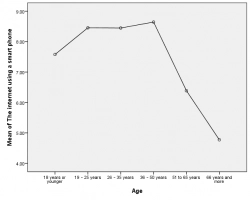Market study into the retail grocery sector and consumer decision-making
Dr Steven Tucker | Associate Professor of Economics
Dr Michael Cameron | Associate Professor of Economics
 Groceries are an essential purchase for all consumers as well as a major expense for most households. In the year to December 2020, more than $22 billion was spent at supermarkets and grocery stores. In the year to June 2019, food was the second largest expense for New Zealand households, with an average spend of $234 a week.
Groceries are an essential purchase for all consumers as well as a major expense for most households. In the year to December 2020, more than $22 billion was spent at supermarkets and grocery stores. In the year to June 2019, food was the second largest expense for New Zealand households, with an average spend of $234 a week.
The Commerce Commission commissioned NZIBR to conduct research into how complexity affects consumers’ decision making. In particular, the Commission asked for research where the contexts would mimic as much as possible the decision making that consumers face when considering supermarket promotional schemes. This research fed into the Commission’s market study into the grocery sector.
The research was conducted using laboratory experiments conducted in the Waikato Experimental Economics Laboratory (WEEL) at the University of Waikato. Specifically, this research looked at how consumer purchasing decisions are influenced by the existence of multiple discounting schemes, and whether the existence of different schemes led to a reduction in consumer welfare compared to pricing with fewer, or no schemes. It also looked at whether displaying unit prices would mitigate any negative impacts on consumer welfare.
The study found that having multiple discounting schemes led to suboptimal decision making on the part of consumers. This could be interpreted as evidence for how difficult consumer decisions can be. Consumers find it difficult to identify the best choice. The difficulty of consumer decisions is compounded when the consumer is faced with a lot of complexity, such as when there are many different offers, with different pricing schemes, loyalty schemes, and options. That can lead consumers to make poor decisions, that leave them worse off. Reducing the complexity of consumer decision-making would likely lead to better outcomes.
How Collaborative Advantage Can Deliver Low Carbon Solutions
Professor Eva Collins | Associate Dean of Research & Postgraduate – WMS | Director of the New Zealand Institute for Business Research (NZIBR)
 Collaborative advantage is the concept that a group acting collectively can deliver more than the sum of their parts. The importance of collaborative advantage is shown by its inclusion as the final United Nations’ Sustainable Development Goal (SDG). Naming “Partnerships for the Goals” as a separate goal is a testament to the significance of collaboration, particularly for the type of systems change required by the other 16 SDGs.
Collaborative advantage is the concept that a group acting collectively can deliver more than the sum of their parts. The importance of collaborative advantage is shown by its inclusion as the final United Nations’ Sustainable Development Goal (SDG). Naming “Partnerships for the Goals” as a separate goal is a testament to the significance of collaboration, particularly for the type of systems change required by the other 16 SDGs.
Although forming collaborations is a powerful strategy to tackle complex problems such as climate change, it is notoriously difficult to implement in practice. Collaborations fail because of a lack of trust, competitive self- interest and failure to agree on shared objectives.
In May 2019, a group of stakeholders from the heavy transport sector was brought together by the Sustainable Business Council (sbc.org.nz) to explore how to deliver low carbon solutions for the sector.
The group identified opportunities to transition the freight sector to net zero by 2050. Participants believed the ambitious goal could be achieved through true collaboration, sharing a vision, knowledge and resources.
The collaboration began in February 2020, completing its work in April 2021 with the launch of the Low Carbon Pathway Report . The collaboration was documented so that the learnings could be shared to make future efforts more effective.
The researcher had access as an observer to all meetings and meeting documents. Collaboration participants were interviewed after the collaboration in November and December 2020 (before the report launch in April). Quotes in the report are from the collaboration participants.
Impacts of agricultural domestic supports on developing economies
Dr Anna Strutt | Professor of Economics
This study, commissioned by the New Zealand Ministry for Primary Industries (MPI), estimates the impacts of agricultural domestic supports in farm-supporting countries and in other – especially developing – economies. View as PDF.
 Agricultural price and trade policies were highly distortive of world food, feed and fibre markets in the latter half of the 20th century, but many reforms began in the 1980s and continued following the implementation over 1995-2004 of the Uruguay Round Agreement on Agriculture. Some import tariffs have since come down further, and export subsidies were outlawed by WTO members in 2015.
Agricultural price and trade policies were highly distortive of world food, feed and fibre markets in the latter half of the 20th century, but many reforms began in the 1980s and continued following the implementation over 1995-2004 of the Uruguay Round Agreement on Agriculture. Some import tariffs have since come down further, and export subsidies were outlawed by WTO members in 2015.
However, domestic support has replaced the assistance previously provided to farmers by tariff. Over the past 20 years, export subsidies have been largely abolished and import tariffs on farm products have fallen considerably, while domestic subsidies to farmers have more than doubled in OECD countries and are starting to emerge in emerging economies.
To inform discussions, the present study was commissioned by the New Zealand Ministry for Primary Industries. It seeks to estimate the impacts of agricultural domestic supports globally and in both farm-supporting countries and other – especially developing – economies. It does so by calibrating the database of the global economywide GTAP (Global Trade Analysis Project) model to 2019 and then simulating the removal of food and agricultural domestic supports globally.
The estimated impacts of globally removing domestic support are of course negative for supported farmers, who are primarily in Western Europe, Northeast Asia and South Asia, but they are positive for most farmers in the rest of the world (and for the global economy). Impacts vary across product groups, consistent with the considerable variations in levels of support across agricultural industries.
The global economic welfare benefit from removing all domestic support to farmers is conservatively estimated to be US$4.7 billion per year. The most assisted farmers would be worse off if not compensated, but all other farmers would gain from higher output prices, including those in supporting countries who currently receive little or no support.
A side benefit of removing domestic supports is that it boosts government budgets in reforming countries. That allows society to re-purpose that spending to achieve more socially desirable objectives. Examples include investing in growth-enhancing rural public goods such as education, health, agricultural research, and transport and communication infrastructure. It could also include paying farmers for their provision of ecosystem services. Targeted income supplements fully decoupled from production, via generic social safety nets/trampolines, are another possible use of savings from removing distortionary domestic supports and instead reducing poverty and inequality directly.
Fertilizer expenditures in Philippines farms in Central Luzon
Dr Gazi Hassan | Senior Lecturer in Economics
 The International Rice Research Institute (IRRI), based in Manilla is an independent, non-profit, research and educational institute, founded in 1960 by the Ford and Rockefeller foundations with support from the Philippine government. The institute has offices in 17 rice-growing countries in Asia and Africa.
The International Rice Research Institute (IRRI), based in Manilla is an independent, non-profit, research and educational institute, founded in 1960 by the Ford and Rockefeller foundations with support from the Philippine government. The institute has offices in 17 rice-growing countries in Asia and Africa.
It is the world’s premier research organisation dedicated to improving the health and welfare of those who depend on rice-based agri-food systems and contributing to the environmental sustainability of rice farming for future generations.
In March 2019, the Philippine government has promulgated a bill called the Rice Tariffication Law (RTL), which abandoned the quantitative restrictions on imports and replaced them with ad valorem tariffs. Today with RTL in place, there is more concern on how farmers would become more competitive in rice production in the face of lower prices of paddy.
The implications of the RTL on rice farmers are three-fold: 1) top farmers are already competitive and can continue to operate, but with lower profit in the short term due to lower farm prices, 2) mid-level farmers should be able to reduce production cost and increase income with suitable technological support and investment, and 3) less efficient farmers are unlikely to become competitive even with substantial government support.
Farmers under the third category may need to be transitioned out of rice production towards other higher value crops because they may lack capital for fertiliser. This project explores fertilizer use patterns using a unique panel data based on the Central Luzon Loop Survey collected by IRRI every 5 years since 1960. Since lack of working capital is considered as a major constraint for cultivating other crops, this project examines examine the impact of remittances which alleviates cash constraints of recipient households. The project’s outputs were:
- To explore a relationship between farm household total expenditure on fertilizer and overseas remittances inflow in the Philippines.
- Create a database from the loop surveys in the Philippines, conducted in the wet and dry season every four to five years from 1966-67 to 2015-16.
- The main finding is that remittances recipients' families invest more in fertilizer to enhance rice productivity.
The households with fertilizer expenditure in the mid-range tend to leverage the benefit of remittances the most.
The New Zealand Institute for Business Research (NZIBR) and AskYourTeam Partnership
 AskYourTeam was established in 2014 as a new business empowerment practice providing insights and information for organisational leaders. It is trusted by organisations across New Zealand given its knowledge systems and analyses are based on evidence from robust academic and scholarly research. With over 14 million data points, AskYourTeam is one of the richest sources of business performance data in New Zealand.
AskYourTeam was established in 2014 as a new business empowerment practice providing insights and information for organisational leaders. It is trusted by organisations across New Zealand given its knowledge systems and analyses are based on evidence from robust academic and scholarly research. With over 14 million data points, AskYourTeam is one of the richest sources of business performance data in New Zealand.
The partnership between the New Zealand Institute for Business Research (NZIBR) and AskYourTeam started in 2014. At that time Associate Professor Asad Mohsin was Director of NZIBR. The relationship strengthened in 2015 when AskYourTeam contacted Professor Frank Scrimgeour to write blogs for AskYourTeam website. A number of blogs were written on different topics including leadership, performance management and social media. In late 2015, AskYourTeam and NZIBR signed a contract for a research project. The project was related to the validation of professional advice instruments of AskYourTeam. The project was successfully completed. Since then, on behalf of NZIBR, Professor Frank Scrimgeour and Dr Vijay Kumar has done more than ten research projects for AskYourTeam.
In 2019, NZIBR organised a one-day conference on the ‘Future of Work’. The conference proved to be very successful over 150 paying delegates. AskYourTeam participated in the conference as a major sponsor. In the same year, NZIBR Director Associate Professor Eva Collins, Professor Frank Scrimgeour and Dr Vijay Kumar visited AskYourTeam Head Office in Havelock North to strengthen the partnership and to explore the possibilities of using AskYourTeam database for student projects and academic research.
Recently Professor Frank Scrimgeour, Dr Vijay Kumar and Dr Nelwin Luo completed a comprehensive research project for AskYourTeam. The project focused on the review of methodology and philosophy of AskYourTeam, the evaluation of base instrument and identification of the new themes that have emerged as a result of COVID-19 across major sectors in Australasia.
AskYourTeam is keen to continue to relationship with NZIBR. The AskYourTeam base instrument database contains more than 14 million datapoints from over 100,000 participants allowing validity and reliability analyses to be conducted. There is potential for NZIBR to do more work for AskYourTeam related to content and construction validation.
2020
 The importance of social enterprises for addressing grand challenges is receiving increased recognition. Yet little is known about how to measure an enterprise’s level of social and environmental orientation from their communication, nor when such language helps or harms social enterprise performance.
The importance of social enterprises for addressing grand challenges is receiving increased recognition. Yet little is known about how to measure an enterprise’s level of social and environmental orientation from their communication, nor when such language helps or harms social enterprise performance.
Professor Albert Bifet – Te Ipu o te Mahara AI Institute Director, established a collaboration between the AI Institute and Waikato Management School to begin shedding new light on this topic through the application of AI, with support of a competitive Entrepreneurial Universities funded summer internship.
Summer Intern, MSc Eve Mann, with the supervision of Dr Amanda J Williamson, Professor Bifet and assistance from Dr Heitor Murilo Gomes, drew on artificial intelligence to design an initial measure of socially and environmentally oriented language.
The measure employs 12,000 pages of text on social-environment topics, to classify how close this language matches the “about us” pages of corporate websites. The results of the research are being processed, and are poised to open many opportunities for its application. The team plans to utilize the measure to examine under what conditions socio-ecological language positively (and negatively) relates to firm performance. This research has the potential to break important ground in ecological and social enterprise research, by providing scholars with a state-of-the-art natural language processing tool for measuring social and environmental language that cannot be measured with traditional approaches. The team welcomes expressions of interest to extend this methodology into different contexts.
 The spread of the Coronavirus and the threat of the associated disease (Covid-19) has resulted in an unprecedented set of economic and public health responses in Indonesia and elsewhere.
The spread of the Coronavirus and the threat of the associated disease (Covid-19) has resulted in an unprecedented set of economic and public health responses in Indonesia and elsewhere.
In a recent study, Professor John Gibson and Dr Susan Olivia - WMS economists, contracted by The Australian National University, analyse direct and indirect effects of Covid-19 and economic responses on life expectancy and poverty in Indonesia.
These two outcomes are viewed as indicators of the quantity and the quality of life. The analysis is partly motivated by a concern that current actions to reduce Covid-19 related deaths and morbidity may indirectly cause more deaths in future, due to a reduction in economic activity that is so great that lower future incomes reduce lower life expectancy below what it otherwise would have been.
The analysis shows that the indirect effects on life expectancy, that operate through lower future income, exceed the direct effects of Covid-19 related deaths by at least five orders of magnitude. The reduction in long-run real income due to the Covid-19 shock may reduce life expectancy by up to 1.7 years, compared to what could otherwise be expected. In contrast, even if the Covid-19 death toll was 40-times worse, the direct effect is that life expectancy would fall by just two days. Given this imbalance between direct and indirect effects, any interventions to reduce the risk of Covid-19 must be finely targeted and must be mindful of the indirect effects. Otherwise, actions to prevent deaths from Covid-19 may end up doing more damage than good, by indirectly reducing life expectancy through lower future incomes.
The analysis of the geographic pattern of poverty effects that is based on almost real-time mobility data is one example of how targeted interventions that are less fiscally costly might be developed. Such interventions should pose less of a burden to future growth and so may help to reduce the indirect effects of the Covid-19 shock. We also find that the effects of Covid-19 on poverty is spatially heterogeneous in Indonesia and the increase in poverty is especially higher in provinces that had lower initial poverty rates. This finding suggests there is a need to broaden social assistance programmes to cover not only the existing poor but also the new poor.
While the Government of Indonesia has taken steps to mitigate the effects of Covid-19 on the poor, a lack of reliable data has caused the risk of mis-targeting as well as delays in the distribution of social assistance to eligible. The implication is that now may be an opportune time for government to evaluate the need to update and invest in innovative data collection methods on the poor for targeting purposes.
2019
Co-Directors of the NZIBR Leadership Unit, Dr Maree Roche and Associate Professor Peter Sun, along with PhD student, Olivia Loeffen, successfully developed and delivered, a ‘Women in Leadership’ training programme, specially designed to cultivate and grow the leadership of high potential women police officers in New Zealand.
After designing the programme, that included focus groups and interviews within the NZ Police, a group of twenty women were selected for the elite training programme. These women demonstrated strong potential to become future leaders within the NZ Police. The programme had three prongs to it.
Firstly, a one-day intensive workshop focusing on providing the necessary mind-set skills and resources required to overcome the challenges women leaders face in the NZ Police.
Part two, a Peer Mentoring Programme, where Police leaders were mentored by women leaders from the Waikato region for several months. This included shadowing these leaders, mentoring conversations, and experiences and learning shared and held by other elite women leaders in the Waikato. The course concluded with a workshop on goal-setting and leadership development and planning for the officers.
The programme received positive reviews from participants who gained a wealth of leadership learning experience. One police officer said: “The biggest thing I learnt from this course is that sometimes we are our own biggest barrier to achieving…as our minds can play tricks on us... but there are ways to break this down. (Knowing)… you want to achieve, and making a plan of how you’re going to do this, is a good start.”
The course has cemented a positive relationship with women leaders in the NZ Police, NZIBR and Waikato Management School more generally. Senior women leaders from NZ Police have shared knowledge and experience at highly attended seminars held by NZIBR, and actively participation in panel discussion at the Women in Leadership day held at the University of Waikato. The relationships, programme and future planning - demonstrate the on-going success of NZIBR in combining research skills and expertise, and developing relationships with the leadership community.
Professor Riccardo Scarpa, a leading economist, studied New Zealand’s retail electricity markets to identify the main reasons for switching behaviour and estimated consumers’ willingness to pay for non-price attributes.
The results provide important insights into residential consumer switching, which enable suppliers to differentiate their products. The analysis is based on an online choice experiment involving 224 residential electricity bill payers.
Professor Scarpa found that non-price attributes are significant determinants of consumer switching. This included call waiting time, length of fixed rate contract, renewable energy, loyalty rewards, supplier ownership and supplier type.
The study also identified three consumer groups with distinct preferences. The first group (40%) is mainly concerned about power bills and would switch suppliers to save at least $125 per year in power bills.
The second group (46%) shows no status quo preference, values all non-price attributes, and particularly dislikes new entrants from other sectors. For this group, electricity suppliers must charge $135 less per year than other suppliers for a 50% chance of attracting new customers. The third group (14%) of consumers are captive and loyal customers who are unlikely to switch supplier for any realistic power bill savings.
 News media play an important role in shaping how the public thinks and feels about entrepreneurship. These public sentiments are a key driver of entrepreneurial activity, but little is known about how they change over time.
News media play an important role in shaping how the public thinks and feels about entrepreneurship. These public sentiments are a key driver of entrepreneurial activity, but little is known about how they change over time.
Using artificial intelligence and machine learning, Dr Amanda Williamson is conducting a study to find out how public sentiments towards entrepreneurship have changed since 2000; and how those changes differ among five English-speaking countries - the US, Canada, UK, NZ and Australia.
The resulting data will then be used to predict within and between country differences in entrepreneurial activity. The study is funded by the Australia & New Zealand Academy of Management (ANZAM) and the British Academy of Management (BAM).
Dr Williamson’s research examines entrepreneurship through a psychological lens; considering the effects of sleep, mood, emotions and health on entrepreneurial behaviour.
2018
 Professor Frank Scrimgeour, Vijay Kumar and Ngoc Thi Minh completed a project for Agenda Waikato. Agenda Waikato addresses the community within approximately a 45-minute drive to Hamilton. This study focuses on the locations within the Waikato region which are located within 45-minute drive to Hamilton. The estimated population of this sub-region in was 316,000. The study provides a framework which contains a comprehensive set of indicators to measure the attractiveness of Waikato sub-region relative to New Zealand. Data was collected from multiple credible sources, included Statistics NZ, the Ministry of Business, Innovation and Employment, NZ Police, Waikato DHB, NIWA and City, District and Regional Councils. The indicators were classified in three ways: Agenda Waikato themes; Treasury capital classifications of financial/physical capital, social capital, human capital and environmental capital; and OECD well-being criteria. Overall, the results show that the Waikato sub-region was more attractive relative to New Zealand. This research was presented in a public forum at Hamilton Airport and it received significant media attention. For more information,
Professor Frank Scrimgeour, Vijay Kumar and Ngoc Thi Minh completed a project for Agenda Waikato. Agenda Waikato addresses the community within approximately a 45-minute drive to Hamilton. This study focuses on the locations within the Waikato region which are located within 45-minute drive to Hamilton. The estimated population of this sub-region in was 316,000. The study provides a framework which contains a comprehensive set of indicators to measure the attractiveness of Waikato sub-region relative to New Zealand. Data was collected from multiple credible sources, included Statistics NZ, the Ministry of Business, Innovation and Employment, NZ Police, Waikato DHB, NIWA and City, District and Regional Councils. The indicators were classified in three ways: Agenda Waikato themes; Treasury capital classifications of financial/physical capital, social capital, human capital and environmental capital; and OECD well-being criteria. Overall, the results show that the Waikato sub-region was more attractive relative to New Zealand. This research was presented in a public forum at Hamilton Airport and it received significant media attention. For more information,
2017
Non-tariff measures (NTMs) are policy measures, other than tariffs, which can affect international trade. They include a wide variety of measures implemented for a range of reasons, including public policy objectives such as biosecurity or the protection of consumer health. NTMs are increasingly recognised as potentially much more important than tariffs in hampering flows of international trade. However, international data on NTMs has been limited and patchy to date.
Comprehensive and high quality data on NTMs in New Zealand was collected to contribute to a global database. This was part of an international effort, overseen by The United Nations Conference on Trade and Development (UNCTAD), to prepare transparent and consistent databases of NTMs. The University of Waikato team, Associate Professor Anna Strutt and PhD student Mike Webb, contributed the New Zealand data. The World Bank funded the initial data collation, with the 2017 update funded by the Economic Research Institute for ASEAN and East Asia (ERIA).
The initial New Zealand NTM dataset was presented at an ERIA-UNCTAD 2016 workshop in Tokyo. The University of Waikato team then presented at a workshop hosted by MFAT in July 2016, providing the opportunity for feedback from a range of key stakeholders including government department representatives. The updated New Zealand dataset was presented at an ERIA-UNCTAD workshop held in Jakarta in March 2017. This workshop brought together researchers from Australia, China, India, Japan, Korea and New Zealand to present the latest NTM data for their countries. Recognising the importance of NTMs in international trade, senior representatives from national and international agencies also participated in this workshop. These new datasets have already contributed to academic conference presentations and publications by University of Waikato researchers. The new datasets and associated research are expected make significant contributions to policy.
The kiwifruit industry is a significant contributor to both regional economies and the national economy. The development of new varieties has potential to substantially increase that contribution. The report estimates the economic contribution of the kiwifruit industry and how this will change though time as a result of additional varieties. The study addresses the work in a manner consistent with a Vision Mātauranga framework, and its commitment to Māori knowledge, resources and people.
The estimates are made using a 106-sector economic model developed by Professor Hughes. The 106-sector economic model quantifies the inputs it received from all other sectors, such as electricity distribution, in order to produce the goods and services sold in a given period (output level in dollars) usually a year.
 The results show that production associated with the introduction of new kiwifruit varieties is likely to expand economic benefits to regional New Zealand and the country as a whole. The employment contribution to the nation is expected to be an additional 29,000 FTE by 2029/30. The GDP contribution is expected to be an additional $3.5b per annum by 2029/30. The benefits are largest in the Bay of Plenty, but are also important in other regions such as Northland. They are very important for Māori given that they facilitate employment within tribal areas and enable tribal members to derive income and employment in their “home places”. This suggests kiwifruit will continue to be the largest horticultural export industry in 2030. However, nothing should be taken for granted. Disease and pests can damage the industry very quickly. Offshore kiwifruit producers have the potential to enhance their product mix and value chain efficiency. Despite the qualifications this analysis suggests the successful introduction and expansion of new kiwifruit varieties has the potential to significantly enrich the regional economics of kiwifruit growing regions and the nation as a whole.
The results show that production associated with the introduction of new kiwifruit varieties is likely to expand economic benefits to regional New Zealand and the country as a whole. The employment contribution to the nation is expected to be an additional 29,000 FTE by 2029/30. The GDP contribution is expected to be an additional $3.5b per annum by 2029/30. The benefits are largest in the Bay of Plenty, but are also important in other regions such as Northland. They are very important for Māori given that they facilitate employment within tribal areas and enable tribal members to derive income and employment in their “home places”. This suggests kiwifruit will continue to be the largest horticultural export industry in 2030. However, nothing should be taken for granted. Disease and pests can damage the industry very quickly. Offshore kiwifruit producers have the potential to enhance their product mix and value chain efficiency. Despite the qualifications this analysis suggests the successful introduction and expansion of new kiwifruit varieties has the potential to significantly enrich the regional economics of kiwifruit growing regions and the nation as a whole.
The report was prepared by Professor Frank Scrimgeour, Dr. Warren Hughes and Vijay Kumar on economic contribution of kiwifruit industry was released in Parliament on 27th June 2017.
 At the Qinshuhuang Mausoleum, Xi’an, the research used both qualitative and quantitative techniques and involved over 1200 respondents. The focus lay in visitor satisfaction and the determinants of that satisfaction to enable the site management to better understand what motivated visitors, and how they assessed information about the site. Photo shows Professor Ryan at the site.
At the Qinshuhuang Mausoleum, Xi’an, the research used both qualitative and quantitative techniques and involved over 1200 respondents. The focus lay in visitor satisfaction and the determinants of that satisfaction to enable the site management to better understand what motivated visitors, and how they assessed information about the site. Photo shows Professor Ryan at the site.
One subsidiary aspect of the research was the examination of inter-generational differences in the domestic market as to motives, perceptions and use of digital sources. This question has significance due to the differences in life experiences across the last three generations of those living in China and the way in which the Chinese Communist Party uses the soft power of tourism to consolidate its position, and the answers have practical marketing and social management implications in the Chinese context.
 The graph (derived from a paper given at the 2018 APAC-Chrie conference in Guangzhou by Chen, Ryan and He, 2018) illustrates that intergenerational differences do exist in the Chinese market with reference to smartphone usage. It is proposed that these differences also determine responses to the Chinese policies on the use of tourism to generate a consciousness of what it is to be Chinese in the contemporary People’s Republic.
The graph (derived from a paper given at the 2018 APAC-Chrie conference in Guangzhou by Chen, Ryan and He, 2018) illustrates that intergenerational differences do exist in the Chinese market with reference to smartphone usage. It is proposed that these differences also determine responses to the Chinese policies on the use of tourism to generate a consciousness of what it is to be Chinese in the contemporary People’s Republic.

Community-based participatory research (CBPR) and community engaged research (CEnR) have been implemented across diverse research settings and communities which have faced historic and current health inequities. In its core, CBPR and CEnR includes principles of equitable relationships that guide research with community partners. The “Engage for Equity (E2): Advancing Community Engaged Partnerships” study (2015-2020, funded by the National Institute of Nursing Research in the U.S. National Institutes of Health) aims to test and confirm promising practices in CBPR and CEnR. This study seeks to support academic-community research teams to assess their own partnering practices, set their own goals, and make changes to improve their effectiveness to reach their desired goals. This research supports the development of Responsible Management for partnerships in health.
The Engage for Equity study has launched workshops with tools and resources for evaluation and reflection for CBPR and CEnR projects and partnerships. We are now in the intervention phase of our study and we completed workshops in the Fall, 2017 with projects that completed an online survey in 2016; evaluation is underway and will be completed in late 2018 to see if the interventions improve partnership processes and project outcomes. We have launched our new Engage for Equity website with tools and resources that may be accessed and downloaded.
Our team is in the process on analysing data from the initial survey and have numerous manuscripts in preparation for submission. We have presented our findings at the annual meeting of the American Public Health Association (November 2017). The grant also supported the development of a new edited volume on CBPR: Wallerstein, N., Duran, B., Oetzel, J.G., & Minkler, M. (2018). Community-based participatory research for health (3rd ed.). San Francisco: Jossey-Bass.
